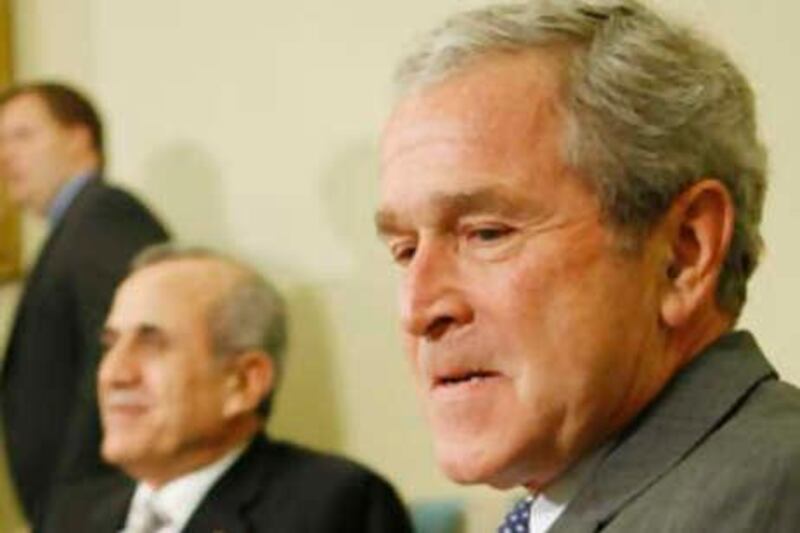US President George W Bush, hosting unprecedented economic crisis talks at the White House, said yesterday he hoped to reach an agreement "very shortly" with lawmakers on a rescue package. "My hope is that we can reach an agreement very shortly," Bush said as he met with top lawmakers as well as White House rivals John McCain and Barack Obama in his cabinet room. The US President George Bush issued an unprecedented summons for both candidates and congressional leaders to join him at the White House to hammer out a way forward through the financial chaos and election year politics swirled around the administration's proposed $700 billion bailout plan.
Mr Bush predicted "a long and painful recession" unless Congress takes quick action, but his prodding of lawmakers appeared incongruous as legislative leaders said they already were near a deal. In all, voters were treated to an extraordinary display of political maneuvering yesterday. The Republican candidate Mr McCain said he wanted to delay Tomorrow's presidential debate and was suspending his campaign to return to Washington.
Mr Bush addressed the nation in a prime-time television slot for the first time in a year, telling citizens "our entire economy is in danger." And Mr Obama, who rejected Mr McCain's call for a debate delay, joined his opponent in issuing a statement declaring that American politicians must overcome partisanship or "risk an economic catastrophe." The heart of the enormous bailout plan involves the government buying up sour assets of shaky financial firms, action designed to keep essential credit markets operand and preventing what some fear would be an economic calamity not seen since the Great Depression of the 1930s.
In their joint statement, Mr McCain and Mr Obama said now is the time to "rise above politics for the good of the country. We cannot risk an economic catastrophe." But politics remained front and centre. The candidates spoke privately yesterday drawing up the document, but McCain beat Obama to the punch with the first public statement, saying the Bush plan to prop up the financial community seemed headed for defeat and a bipartisan solution was needed urgently.
"It has become clear that no consensus has developed to support the administration's proposal," McCain said. "I do not believe that the plan on the table will pass as it currently stands, and we are running out of time." But this morning, Mr McCain said he was confident that Congress would reach consensus before markets open on Monday. Mr McCain was speaking at the Clinton Global Initiative in New York, saying bipartisan support was needed in both the House and Senate. He explained plans to return to Washington later in the day by declaring "time is short and doing nothing is not an option."
The Democratic Congressman Barney Frank, the chairman of the House committee shepherding the bailout plan, said all sides were getting close to a deal and accused Mr McCain of "trying to take credit for something that's already happening without him." Mr McCain said he had spoken to Mr Bush, a fellow Republican, and asked him to convene a leadership meeting at the White House. Mr Bush, who rarely calls legislative leaders to push priority projects, took the unusual step of calling Mr Obama personally, said presidential spokeswoman Dana Perino. Mr Obama spokesman Bill Burton said the senator would attend and "will continue to work in a bipartisan spirit and do whatever is necessary to come up with a final solution."
Regardless, Mr Obama was not bending on his rejection of Mr McCain's attempt to delay their first debate tomorrow at the University of Mississippi, having declared American voters needed to hear the candidates' views "now more than ever." "It's my belief that this is exactly the time when the American people need to hear from the person who, in approximately 40 days, will be responsible for dealing with this mess," Mr Obama said.
Mr McCain said he was putting the good of the country ahead of politics, but his announcement was clearly a political move - an attempt to outmaneuver Mr Obama on an issue, the economy, that as been hurting the Republican's standing in the polls. While Mr McCain said he would "suspend" his campaign, including advertising and fundraising, it simply will move to Washington where the four-term senator will remain in the spotlight, regardless.
Mr Obama repeatedly stressed at his news conference he called Mr McCain first to propose they issue a joint statement in support of a package to help fix the economy as soon as possible. He said McCain called back several hours later and agreed to the idea of a statement but said he wanted to postpone the debate and hold joint meetings in Washington. Mr Obama said he suggested they first issue a joint statement showing bipartisanship.
"When I got back to the hotel, he had gone on television to announce what he was going to do," Mr Obama said. *AP






